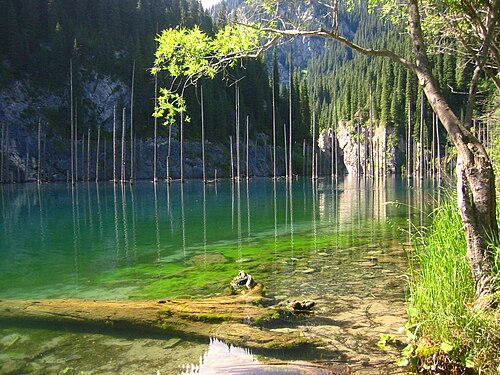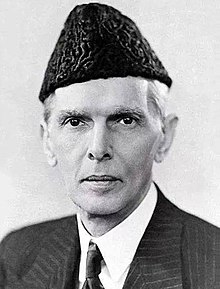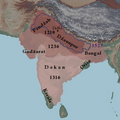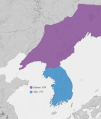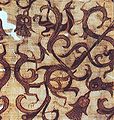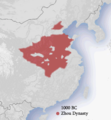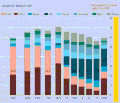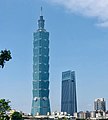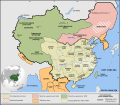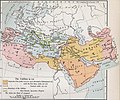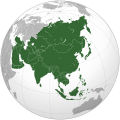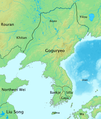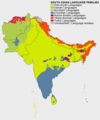The Asia Portal
Asia AY -zhəAY -shəcontinent in the world by both land area and population. It covers an area of more than 44 million square kilometers, about 30% of Earth 's total land area and 8% of Earth's total surface area. The continent, which has long been home to the majority of the human population , was the site of many of the first civilizations . Its 4.7 billion people constitute roughly 60% of the world's population.
Asia shares the landmass of Eurasia with Europe , and of Afro-Eurasia with both Europe and Africa . In general terms, it is bounded on the east by the Pacific Ocean , on the south by the Indian Ocean , and on the north by the Arctic Ocean . The border of Asia with Europe is a historical and cultural construct , as there is no clear physical and geographical separation between them. A commonly accepted division places Asia to the east of the Suez Canal separating it from Africa; and to the east of the Turkish straits , the Ural Mountains and Ural River , and to the south of the Caucasus Mountains and the Caspian and Black seas, separating it from Europe.
Since the concept of Asia derives from the term for the eastern region from a European perspective, Asia is the remaining vast area of Eurasia minus Europe. Thefore, Asia is a region where various independent cultures coexist rather than sharing a single culture, and the boundary between Europe is somewhat arbitrary and has moved since its first conception in classical antiquity . The division of Eurasia into two continents reflects East–West cultural differences, some of which vary on a spectrum. (Full article...
Afghanistan Islamic Emirate of Afghanistan , is a landlocked country located at the crossroads of Central Asia and South Asia . It is bordered by Pakistan to the east and south , Iran to the west , Turkmenistan to the northwest , Uzbekistan to the north , Tajikistan to the northeast , and China to the northeast and east . Occupying 652,864 square kilometers (252,072 sq mi) of land, the country is predominantly mountainous with plains in the north and the southwest , which are separated by the Hindu Kush mountain range. Kabul is the country's capital and largest city. According to the World Population review, as of 2023[update] Afghanistan's population is 43 million. The National Statistics Information Authority of Afghanistan estimated the population to be 32.9 million as of 2020[update]
Human habitation in Afghanistan dates to the
Middle Paleolithic era. Popularly referred to as the
graveyard of empires , the land
has witnessed numerous military campaigns , including those by
the Persians ,
Alexander the Great , the
Maurya Empire ,
Arab Muslims , the
Mongols , the
British , the
Soviet Union , and
a US-led coalition . Afghanistan also served as the source from which the
Greco-Bactrians and the
Mughals , among others, rose to form major empires. The various conquests and periods in both the
Iranian and
Indian cultural spheres. the area was a center for
Zoroastrianism , Buddhism, Hinduism, and later Islam. The modern state of Afghanistan began with the
Durrani Afghan Empire in the 18th century, although
Dost Mohammad Khan is sometimes considered to be the founder of the first
modern Afghan state . Afghanistan became a
buffer state in the
Great Game between the
British Empire and the
Russian Empire . From India, the British attempted to subjugate Afghanistan but were repelled in the
First Anglo-Afghan War ; the
Second Anglo-Afghan War saw a British victory. Following the
Third Anglo-Afghan War in 1919, Afghanistan became free of foreign political hegemony, and emerged as the independent
Kingdom of Afghanistan in 1926. This monarchy lasted almost half a century, until
Zahir Shah was
overthrown in 1973 , following which the
Republic of Afghanistan was established. (
Full article... )
List of selected countries
Muhammad Ali Jinnah Mahomedali Jinnahbhai ; 25 December 1876 – 11 September 1948) was a barrister, politician, and the founder of Pakistan . Jinnah served as the leader of the All-India Muslim League from 1913 until the inception of Pakistan on 14 August 1947, and then as the Republic of Pakistan 's first governor-general until his death.
Born at
Wazir Mansion in
Karachi , Jinnah was trained as a
barrister at
Lincoln's Inn in
London , England. Upon his return to
India , he enrolled at the
Bombay High Court , and took an interest in national politics, which eventually replaced his legal practice. Jinnah rose to prominence in the
Indian National Congress in the first two decades of the 20th century. In these early years of his political career, Jinnah advocated
Hindu–Muslim unity , helping to shape the 1916
Lucknow Pact between the Congress and the All-India Muslim League, in which Jinnah had also become prominent. Jinnah became a key leader in the
All-India Home Rule League , and proposed a
fourteen-point constitutional reform plan to safeguard the political rights of
Muslims in the
Indian subcontinent . In 1920, however, Jinnah resigned from the Congress when it agreed to follow a campaign of
satyagraha , which he regarded as
political anarchy . (
Full article... )
List of Featured biographies
The following are images from various Asia-related articles on Wikipedia.
Image 1 Map of Marco Polo's travels (from
History of Asia )
Image 2 Here a Jesuit, Adam Schall von Bell (1592–1666), is dressed as an official of the Chinese Department of Astronomy. (from
History of Asia )
Image 4 Ancient ziggurat, Iraq (from
Culture of Asia )
Image 5 Deoksugung , the palace where Emperor Gojong established
Korean Empire . (from
History of Asia )
Image 6 Balhae in the north,
Later Silla in the south (from
History of Asia )
Image 7 A view of the
Fort St George in 18th-century
Madras . (from
History of Asia )
Image 8 Hinduism expansion in Asia, from its heartland in Indian Subcontinent, to the rest of Asia, especially Southeast Asia, started circa 1st century marked with the establishment of early
Hindu settlements and polities in Southeast Asia . (from
History of Asia )
Image 10 Battle of Talas between Tang dynasty and
Abbasid Caliphate c. 751 (from
History of Asia )
Image 11 The Great Wave off Kanagawa ,
c. 1830 by
Hokusai , an example of art flourishing in the Edo Period (from
History of Asia )
Image 12 Political map of Asia in 1860 (from
History of Asia )
Image 13 The Russian Znamensky Cathedral in
Tyumen built in 1768 (from
Culture of Asia )
Image 14 Đại Việt ,
Champa ,
Angkor Empire and their neighbours, late 13th century (from
History of Asia )
Image 15 Some
henges at
Göbekli Tepe in
Turkey were erected as far back as
9600 BC , predating those of
Stonehenge , by over seven millennia. (from
History of Asia )
Image 16 A Confucian ritual ceremony in
Jeju , South Korea (from
Culture of Asia )
Image 17 Gojong (1852–1919), the 26th king of
Joseon dynasty and the first emperor of
Korean Empire . (from
History of Asia )
Image 18 Map of Asia for early 20th century (from
History of Asia )
Image 19 The
Song dynasty and main polities in Asia c. 1200 (from
History of Asia )
Image 20 The
Syriac Orthodox Saint Ahoadamah Church was a 7th-century church building in the city of
Tikrit , one of the oldest in the world until its destruction by the
Islamic State of Iraq and the Levant on 25 September 2014. (from
Culture of Asia )
Image 21 The Taj Mahal, Agra, India (from
Culture of Asia )
Image 22 Dome of the Rock , an Islamic shrine in
Jerusalem . (from
Culture of Asia )
Image 24 British troops taking
Zhenjiang from Qing troops (from
History of Asia )
Image 25 The
Han dynasty and main polities in Asia c. 200 BC (from
History of Asia )
Image 26 Gyeonghoeru of
Gyeongbokgung , the
Joseon dynasty's royal palace. (from
History of Asia )
Image 27 Sun temple at Konarka, Odisha, India (from
Culture of Asia )
Image 28 Robert Clive and
Mir Jafar after the
Battle of Plassey , 1757 by Francis Hayman (from
History of Asia )
Image 30 Detail of Chinese
silk from the 4th century BCE. The characteristic trade of silk through the
Silk Road connected various regions from China, India, Central Asia, and the Middle East to Europe and Africa. (from
History of Asia )
Image 31 Borobudur , a Buddhist temple in Indonesia (from
Culture of Asia )
Image 32 Political cartoon depicting the Afghan
Emir Sher Ali with the rival "friends" the
Russian Bear and British Lion (1878) (from
History of Asia )
Image 33 A stone image of the
Buddha (from
Culture of Asia )
Image 34 Byzantine and Sassanian Empires in 600 AD (from
History of Asia )
Image 35 Population concentration and boundaries of the
Western Zhou dynasty in China (from
History of Asia )
Image 36 The
Mughal ambassador Khan’Alam in 1618 negotiating with
Shah Abbas the Great of
Iran . (from
History of Asia )
Image 37 The global contribution to world's GDP by major economies from 1 AD to 2003 AD according to Angus Maddison's estimates. Before 18th century, China and India were the two largest economies by GDP output. (from
Asian Century )
Image 38 The
Taipei 101 skyscraper in
Taipei , Taiwan, which was the tallest building in the world from 2004 to 2010 (from
Asian Century )
Image 39 Traditional
Rajasthani garments from
Jaipur ,
Rajasthan (from
Culture of Asia )
Image 41 Daian-ji temple at Nara, Japan (from
Culture of Asia )
Image 42 Projected GDP of 7 largest economies in 2050 (from
Asian Century )
Image 43 The
Grand Mosque in
Kuwait City , one of the largest mosques in the region (from
Culture of Asia )
Image 45 Sculpture of
Prince Shōtoku (from
History of Asia )
Image 47 the
Goryeo ware , which shows splendid culture of
Goryeo in mediaeval Korea. (from
History of Asia )
Image 48 The
Qing conquest of the Ming and expansion of the empire (from
History of Asia )
Image 49 Projected shares of global GDP by region to 2050 (from
Asian Century )
Image 51 The Hindu-Buddhist temple of
Angkor Wat . (from
History of Asia )
Image 52 The Qing Empire in 1832. (from
History of Asia )
Image 53 Machiya in Heian period (from
History of Asia )
Image 54 Detail of the
Dragon Throne used by the
Qianlong Emperor of China,
Forbidden City ,
Qing dynasty . Artifact circulating in U.S. museums on loan from Beijing (from
Culture of Asia )
Image 55 Map of
Vietnam showing the conquest of the south (the
Nam tiến , 1069–1757). (from
History of Asia )
Image 56 Chicken tikka , a well-known dish across the globe, reflects the South Asian cooking style. (from
Culture of Asia )
Image 58 East Asian cultural sphere (from
Culture of Asia )
Image 59 Map of Asia (from
Culture of Asia )
Image 60 Daily life of people from the
Song period at the capital, Bianjing, today's
Kaifeng (from
History of Asia )
Image 61 The
First Persian Empire at its greatest extent, c. 500 BC (from
History of Asia )
Image 62 Korean peninsula in 476 AD. There are three kingdoms and Gaya Union in the picture. This picture shows the heyday of
Goguryeo (from
History of Asia )
Image 63 The
Silk Road in Asia (from
History of Asia )
Image 64 India's middle-class population of 300 million is growing at an annual rate of 5%. Shown here is an upmarket area in
South Mumbai . (from
Asian Century )
Image 65 Invasions, destruction and possible population movements during the
Late Bronze Age collapse , beginning
c. 1200 BC (from
History of Asia )
Image 66 Language families in South Asia (from
Culture of Asia )
Image 67 The third Inter-Korean Summit, which was held in 2018, between South Korean president
Moon Jae-in and North Korean supreme leader
Kim Jong Un . It was a historical event that symbolized the peace of Asia. (from
History of Asia )
Kaindy lake south-east Kazakhstan
... that although he was a former Indonesian prime minister , Soekiman Wirjosandjojo
... that Fakhruddin Ali Ahmed
... that the Empire of Japan turned a Korean royal cemetery at what is now Hyochang Park ?
... that Levantine Arabic Hebrew characters online by Bedouin , Arab Christians , and Druze in Israel ?
... that Ein Samiya Taybeh , the first beer brewed in Palestine , was depopulated in 2023 after harassment by neighboring Israeli settlers ?
... that the popularity of "10 Minutes Lee Hyori led to 2003 being dubbed the "year of Hyori" by domestic media?
... that Sun Haiyan Chinese ambassador to Singapore who was not a member of the Foreign Ministry of China ?
... that University of Nebraska alumnus M. Khalid Roashan 1964 Constitution of Afghanistan ?
... that the Pakistani film Shehr e Tabassum cyberpunk film to be made by an Urdu development team?
... that the Te'omim Cave alabaster quarry, a refuge cave during the Jewish–Roman wars , and a possible center for necromantic activity in late antiquity ? Updated: 6:33, 14 February 2024
Major Religions in Asia
Middle East
Central Asia and Surroundings
Indian Subcontinent
Southeast Asia
East Asia
Category puzzle Select [►] to view subcategories


